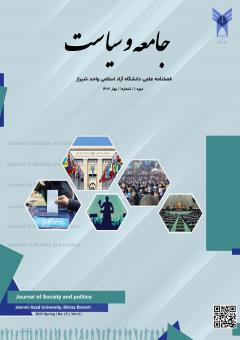علل هژمونیک شدن گفتمان انقلاب اسلامی (با تاکید بر ظرفیت های معناسازی به منظور کنترل رادیکالیسم سیاسی)
محورهای موضوعی : جامعه شناسی سیاسیفرهاد شناوری 1 , مسعود جعفری نژاد 2 * , محمد کاظم کاوه پیشقدم 3
1 - دانشگاه آزاد اسلامی
2 - هیات علمی دانشگاه آزاد اسلامی واحد شهرضا
3 - دانشگاه آزاد
کلید واژه: هژمونیک, گفتمان, ظرفیت های معنایی, مفصل بندی, زنجیره هم ارزی,
چکیده مقاله :
دغدغه گسترش خشونت و بروز سیّالیت اجتماعی نیاز به آینده پژوهی در این خصوص را به یک نیاز اجتماعی تبدیل کرده است. انقلاب اسلامی این ظرفیت را در خود دارد که سطوح مطالعاتی مربوط به دگرگونی های اجتماعی را متحول سازد. در این انقلاب، برخلاف دیگر انقلاب ها و جنبش های اجتماعی، ابعاد مختلف خشونت در پایین ترین حد خود قرار داشت. در این پژوهش تلاش می گردد، ضمن بررسی علل هژمونیک شدن گفتمان انقلاب اسلامی و تبیین ظرفیت های معنایی موجود در آن، عوامل کاهنده و یا فزاینده خشونت را در رادیکالیستی ترین حرکت دهه های اخیر در ایران شناسایی نموده و مورد تجزیه و تحلیل قرار دهد و در این راستا، از روش تحلیل گفتمان برای برقراری ارتباط معنا دار میان متغیرهای مستقل و وابسته استفاده شده و تلاش گردیده است تا در چارچوب نظریه مهندسی فرهنگی حضرت آیت الله خامنه ای، ضمن شناخت عوامل موثر برکاهش یا افزایش خشونت، علل هژمونیک شدن گفتمان انقلاب اسلامی و تدوین برنامه ای منسجم در بستری امن برای انجام تغییرات اجتماعی ارائه گردد. یافته تحقیق در نتیجه گیری بدین شرح است که تمسک به فرهنگ بومی متاثر از الگوهای مذهبی و ملی می تواند ضمن فراهم نمودن بستر لازم برای انجام تغییرات و اصلاحات مورد نیاز در ساختارهای نظام سیاسی و اجتماعی، احتمال بروز خشونت را به حداقل کاهش دهد .
The concern about the spread of violence and the emergence of social fluidity has turned the need for future research into a social need. The Islamic revolution has the capacity to transform the levels of studies related to social transformations. In this revolution, compared to other revolution and social movements, various dimensions of violence were at their lowest level. In this research, while examining the causes of the hegemonic discourse of the Islamic revolution and explaining the semantic capacities in it, it is attempted to identify and analyze the factors that reduce or increase violence in the most radical movement of recent decades in Iran. In this research, the discourse analysis method has been used to establish a meaningful relationship between independent and dependent variables and an effort has been made to present within the framework of Ayatollah Khamenei’s theory of cultural engineering, while recognizing the factors affecting the reduction or increase of violence, the causes of the hegemonic discourse of the Islamic Revolution, and the development of a coherent program in a safe environment to carry out social changes. The conclusion of the research is that clinging to the native culture influenced by religious and national patterns can reduce the possibility of violence to a minimum while providing the necessary platform for the necessary changes and reforms in the structures of the political system and social
-Bidhendy, M. (2004), “Reviewing and analyzing the semantics of interpretation and its epistemological validity in Mulla Sadra’s thought”, Nameh – e – Mofid, No. 41
-Educational House of statistics and reseach method (2015), “Variable and its types’
-Foucault, Michel (1999), What dreams do Iranians have in their heads?, (H. Masoumi Hamadani Trans.), Tehran, Hermas publication.
-Foucault Michel (2012), Iran, the soul of the soulless world, (N. Sarkhosh & A. Jahandideh Trans.), Tehran, Ney publication.
-Imam Khomeini, Sahifeh-e-Noor, Vol. 1
-Imam Khomeini, Sahifeh-e- Noor, Vol. 10
-Imam Khomeini, Sahifeh-e-Noor, Vol. 15
-Jafari, M, T (1994), “The unity of the Hozeh and The university”, Naba, No. 14, January- February
-Jorgensen, M. Phillips, l (2013), Theory and Method in discours analysis (H. JallilI Trans.), Ney publication.
-Kate, Nash (2001), contemporary political sociology, (M. Delforouz Trans.), Tehrak, Kavir publication.
-Mirsepasi, Ali (2010), A reflection on Iranian modernity, Tehran, Moaser publication.
-Mohseni, Manouchehr (1989), Introduction to sociology, Tehran, eshragh publication.
-Motahhari, Mortaza (No date), Qom, (First ed.) Sadra publication.
-Motahhari, Mortaza (No date), Qom, Sadra publication.
-Nazari, Ali (2008), The discourse of identity and the Islamic revolution of Iran, Tehran, Shabak publication.
-Tabatabaei, Sadegh (1999), Socio-political memoirs of Dr. sadegh Tabatabaei, Vol. 3(ناشر)
-Vahdat, Farzin (2004), Iran’s confrontation with modernity, Tehran, ghoghnous publication.
-Yazdi, Ebrahim (1989), Last efforts in last days, Tehran, Ghalam publication.
-Zoo’elm, Ali(1994), “Introdoction about Calture”, Faslnameh Farhang Omoomi, No. 5, Winter

